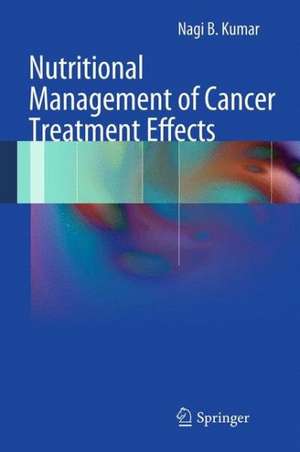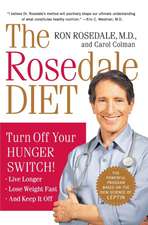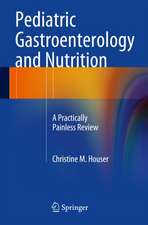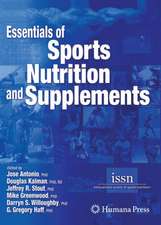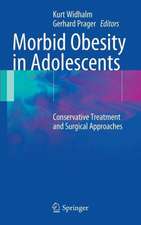Nutritional Management of Cancer Treatment Effects
Autor Nagi B. Kumaren Limba Engleză Paperback – 13 apr 2014
| Toate formatele și edițiile | Preț | Express |
|---|---|---|
| Paperback (1) | 780.29 lei 6-8 săpt. | |
| Springer Berlin, Heidelberg – 13 apr 2014 | 780.29 lei 6-8 săpt. | |
| Hardback (1) | 1101.21 lei 6-8 săpt. | |
| Springer Berlin, Heidelberg – 18 feb 2012 | 1101.21 lei 6-8 săpt. |
Preț: 780.29 lei
Preț vechi: 821.35 lei
-5% Nou
Puncte Express: 1170
Preț estimativ în valută:
149.31€ • 156.28$ • 124.27£
149.31€ • 156.28$ • 124.27£
Carte tipărită la comandă
Livrare economică 31 martie-14 aprilie
Preluare comenzi: 021 569.72.76
Specificații
ISBN-13: 9783642428913
ISBN-10: 3642428916
Pagini: 320
Ilustrații: XVIII, 302 p.
Dimensiuni: 155 x 235 x 17 mm
Greutate: 0.45 kg
Ediția:2012
Editura: Springer Berlin, Heidelberg
Colecția Springer
Locul publicării:Berlin, Heidelberg, Germany
ISBN-10: 3642428916
Pagini: 320
Ilustrații: XVIII, 302 p.
Dimensiuni: 155 x 235 x 17 mm
Greutate: 0.45 kg
Ediția:2012
Editura: Springer Berlin, Heidelberg
Colecția Springer
Locul publicării:Berlin, Heidelberg, Germany
Public țintă
Professional/practitionerCuprins
Part 1: Introduction
Magnitude of the problem and establishing need.-Number of individuals diagnosed with cancer.-Number of cancer survivors.-Need for strategies to improve patient outcomes and improve quality of life.-Overview of Current treatments and related symptoms.-Need for a systematic, proactive nutritional approaches to specific symptoms related to novel and current cancer treatment.
Part 2: Screening, Assessment and re-assessment of the Cancer Patient
Timing.-Tools and variables for assessment.-Epidemiological.-Social.-Psychological.-Physiological.-Co-morbidities-Medical history.-Nutritional deficits.-Planning Nutritional Care and follow up.-Role of Interdisciplinary teams.
Part 3: Physiological and psychological Symptoms of Cancer Treatment
Cancer Cachexia.-Cancer Anorexia.-Mucositis.-Dysphagia.-Radiation enteritis.-Diarrhea.-Nausea & Vomiting.-Depression.-Anxiety.-Fatigue.-Spontaneous Menopause.-Cognitive impairment.-Pain.
Part 4: Concluding Remarks
Summary of Future Directions in Symptom Management Research.
Magnitude of the problem and establishing need.-Number of individuals diagnosed with cancer.-Number of cancer survivors.-Need for strategies to improve patient outcomes and improve quality of life.-Overview of Current treatments and related symptoms.-Need for a systematic, proactive nutritional approaches to specific symptoms related to novel and current cancer treatment.
Part 2: Screening, Assessment and re-assessment of the Cancer Patient
Timing.-Tools and variables for assessment.-Epidemiological.-Social.-Psychological.-Physiological.-Co-morbidities-Medical history.-Nutritional deficits.-Planning Nutritional Care and follow up.-Role of Interdisciplinary teams.
Part 3: Physiological and psychological Symptoms of Cancer Treatment
Cancer Cachexia.-Cancer Anorexia.-Mucositis.-Dysphagia.-Radiation enteritis.-Diarrhea.-Nausea & Vomiting.-Depression.-Anxiety.-Fatigue.-Spontaneous Menopause.-Cognitive impairment.-Pain.
Part 4: Concluding Remarks
Summary of Future Directions in Symptom Management Research.
Notă biografică
Nagi B. Kumar, Ph.D., R.D., FADA: is a Senior Member in the Population Sciences Division at the Moffitt Cancer Center and a Professor in the Oncologic Sciences Department at the University of South Florida College of Medicine. Dr. Kumar is a Registered Dietitian and a Fellow of the American Dietetic Association and obtained her clinical training at the Elmhurst General, Mt. Sinai School of Medicine and Doctoral training at the University of South Florida College of Medicine. She has been in clinical nutrition practice for the past 33 years, and led the establishment and implementation of the Clinical Oncology Nutrition Program at the Moffitt Cancer Center in1986, and was the Director of this program until 2006. Dr. Kumar’s is currently a Professor/Research Scientist, Senior Member at the Moffitt Cancer Center. She is the Director of Nutrition Research and Co-Leader of the Integrative Medicine Program at the Cancer Center focused on preventive medicine. Her focus of research is to examine the role of nutrients, lifestyle factors and other agents in prevention, treatment and survival and understanding the potential mechanism of action. Dr. Kumar’s group is currently conducting several clinical trials examining the safety and effectiveness of purified isoflavones, green tea catechins, n-3 fatty acids, curcuminoid complex, tannic acid, anthocyanins, resveratrol and lycopene in prostate and other cancers for prevention, treatment and in treating cancer survivors suffering from symptoms of cancer treatment. Her research is funded by the National Institute of Health, National Cancer Center and the Department of Defense. This Endeavour has resulted in 75 national and international peer-reviewed publications in scientific journals and over 150 presentations in national and international symposia. Dr. Kumar represents the Cancer Center, University of South Florida and the National Cancer Institute in public forums and a spokes person on these topics.In addition, notably, Dr. Kumar was a co-author of the “Good Book of Nutrition” with 1 million published and 100% proceeds donated to the American Cancer Society;(1988); .First author of (Kumar NB, Moyers S & Schapira DV) Forkwise: Diet in the Prevention of Cancer. H. Lee Moffitt Cancer Center & Research Center, Tampa, Florida. 1998 January, 20,000 published and sold only at Moffitt Cancer Center; First author, (Kumar NB, Moyers S, Allen K, Riccardi D & Besterman K.) of Integrative Nutritional Therapies in Cancer Treatment & Prevention. Facts & Comparisons, a division of Lippincott Williams & Wilkins Inc., A Wolters Kluwer Company, St. Louis, Missouri, 2002 January. With her research experience, teaching skills both to the scientific community and public at large and her prolific communication skills, Dr. Kumar is uniquely qualified to author this book.
Textul de pe ultima copertă
While the benefits of modern cancer treatments are becoming ever more evident, many cancer patients continue to be at risk for developing physiological and psychological treatment effects that may lead to premature morbidity and death. Nutrition is one important aspect that needs to be considered throughout the clinical spectrum of patient care and management. Malnutrition and its related symptoms are both frequent and deleterious consequences of treatment in cancer patients. Targeted nutritional interventions offer a new avenue for the prevention or management of malnutrition, cognitive impairment, obesity, osteoporosis, and other symptoms of critical significance.
Despite the importance of nutrition in ameliorating the symptoms of cancer treatment, publications providing up-to-date information on novel nutritional approaches and strategies are lacking. This book is intended to fill the void by describing in detail the nutritional strategies that may be employed to alleviate a wide variety of cancer treatment effects. The guidance provided will help to improve the survival and quality of life of cancer patients, and has the potential to dramatically affect how evidence-based clinical practice is established and improved over the coming decade. The author is a distinguished expert in the field who has more than 25 years of experience in oncology nutrition and has been involved in establishing and implementing a Clinical Nutrition Oncology Program.
Despite the importance of nutrition in ameliorating the symptoms of cancer treatment, publications providing up-to-date information on novel nutritional approaches and strategies are lacking. This book is intended to fill the void by describing in detail the nutritional strategies that may be employed to alleviate a wide variety of cancer treatment effects. The guidance provided will help to improve the survival and quality of life of cancer patients, and has the potential to dramatically affect how evidence-based clinical practice is established and improved over the coming decade. The author is a distinguished expert in the field who has more than 25 years of experience in oncology nutrition and has been involved in establishing and implementing a Clinical Nutrition Oncology Program.
Caracteristici
Provides up-to-date information on novel nutritional approaches and strategies in cancer patients Describes in detail the individual symptoms related to cancer treatment and how nutritional approaches may be used to alleviate them Written by a distinguished expert in the field who has more than 25 years of experience in oncology nutrition Includes supplementary material: sn.pub/extras
